人教版下册初一英语语法
新人教版七年级下册英语语法大全
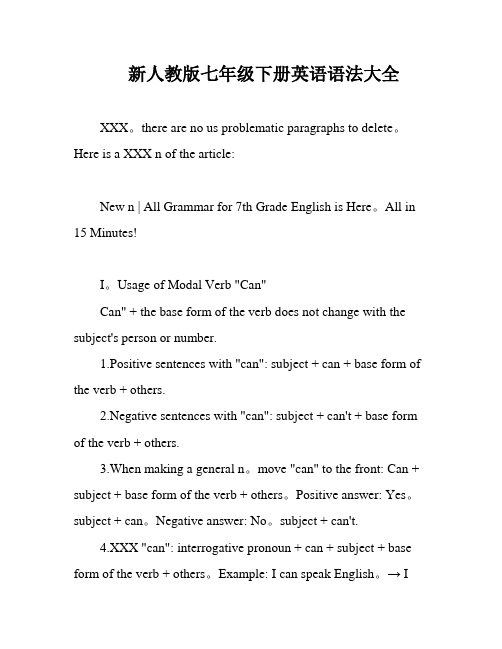
新人教版七年级下册英语语法大全XXX。
there are no us problematic paragraphs to delete。
Here is a XXX n of the article:New n | All Grammar for 7th Grade English is Here。
All in 15 Minutes!I。
Usage of Modal Verb "Can"Can" + the base form of the verb does not change with the subject's person or number.1.Positive sentences with "can": subject + can + base form of the verb + others.2.Negative sentences with "can": subject + can't + base form of the verb + others.3.When making a general n。
move "can" to the front: Can + subject + base form of the verb + others。
Positive answer: Yes。
subject + can。
Negative answer: No。
subject + can't.4.XXX "can": interrogative pronoun + can + subject + base form of the verb + others。
Example: I can speak English。
→ Ican't speak English。
人教版初一(下)英语重点语法汇总

初一(下)重点语法汇总Unit1重点语法一、情态动词can的基本用法情态动词can有一定的词义,但不能独立存在,它必须与动词原形一起构成谓语。
情态动词can没有人称和数的变化。
其具体用法如下:1.表示"能、会",指脑力或体力方面的"能力"。
例如:I can speak English.我会讲英语。
Jim can swim but I can't.吉姆会游泳,但我不会。
2.表示"可能",常用于否定句或疑问句中,指某种可能性。
例如:Han Mei can't be in the classroom.韩梅不可能在教室里。
Can he come here today, please?请问他今天能到这里来吗?3.表示"可以",常用于口语中,指许可或请求做某事。
例如:Can I have a cup of tea, please?请问我可以喝一杯茶吗?You can go out.你可以出去了?二、情态动词的注意事项1. can的口诀:情态动词can、can、can,动词原形跟后面。
变疑问can提前,变否定not后面加上去。
主语人称单复数,情态动词不能变。
2. 情态动词can可以引导肯定句和疑问句。
(1)、肯定句:主语 + can + 动词原形 + 其他成分(2)、疑问句:can + 主语 + 动词原形 + 其他成分3.can 引导的肯定句变为疑问句的方法:(一调二改三问号)(1)、can 提前,首字母大写。
(一调)(2)、肯定句中主语在变成疑问句时的变化。
(二改)如:肯定句:You can feed the animals.你可以喂动物。
疑问句:Can I feed the animals?我能喂动物吗?(3)、在句尾后面加问号。
(三问号)4. Can的一般疑问句回答:(1)、肯定回答:Yes,主语(必须人称代词) + can.(2)、否定回答:No,主语(必须人称代词) + can not (can’t)/mustn’t.Yes 或 no 后要使用逗号,除了I 以外,其他人称都要小写。
完整版)新人教版七年级下册英语语法大全

完整版)新人教版七年级下册英语语法大全Please find below the revised and edited n of the article:New n n | All Grammar of Grade 7 English is Here。
Mastered in 15 Minutes!I。
Usage of Modal Verb "Can"Can + verb infinitive does not change with the subject's person or number.1.Affirmative sentence with "can": Subject + can + verb infinitive + others.2.Negative sentence with "can": Subject + can't + verb infinitive + others.3.To make a general n。
move "can" to the beginning: Can + subject + verb infinitive + others。
Positive answer: Yes。
subject + can。
Negative answer: No。
subject + can't.4.Special n with "can": interrogative word + can + subject + verb infinitive + others。
Example: I can speak English。
→ I can'tspeak English。
→ Can you speak English。
→ What can you speak?II。
人教版七年级下册英语语法重点

人教版七年级下册英语语法重点集团档案编码:[YTTR-YTPT28-YTNTL98-UYTYNN08]一.情态动词can的用法can+动词原形,它不随主语的人称和数而变化。
1.含有can的肯定句:主语+can+谓语动词的原形+其他。
2.含有can的否定句:主语+can't+动词的原形+其他。
3.变一般疑问句时,把can提前:Can+主语+动词原形+其他?肯定回答:Yes,主语+can。
否定回答:No,主语+can't.4.含有can的特殊疑问句:特殊疑问词+can+主语+动词原形+其他?IcanspeakEnglish.→Ican'tspeakEnglish.→CanyouspeakEnglish→Whatcanyouspeak二.whattime和when引导的特殊疑问句1.询问钟点时用whattime,询问日期、月份、年份时用when。
2.What'sthetime=Whattimeisit现在几点了?3.时刻表达法:顺读法和逆读法。
顺读法:“钟点+分钟”直接读数字。
如:7:05sevenfive;8:16eightsixteen逆读法:借助介词past或to表示,要先说分再说钟点。
a.当分钟不超过30分钟时(包括30分钟),即<或=30,用past表示。
其结构为:“分钟+past+整点”意为“几点过几分”。
如:1:25twenty-fivepastoneb.当超过30分钟时,即>30,用to表示。
其结构为:“所差分钟(即60—所过分钟数)+to+下一个整点”,to译成“差”,差几分钟到几点。
如:4:38twenty-twotofivec.当分钟为30分钟用half表示,当分钟为15分钟用aquarter。
三.how引导的特殊疑问句1.how引导的特殊疑问句提问交通方式,其答语分三种情况:a.takea/an/the+交通工具(单数)b.by+交通工具(单数)c.on/in+限定词+交通工具---Howdoyougotoschooleveryday---Itakeabustogotoschooleveryday./Igotoschoolbybuseveryday./Igotoschoolonthebuse veryday.2.howfar用来提问距离,多远,其答语分为两种:(1)用长度单位表示:Itisfivekilometers.(2)用时间表示:It’stwentyminutes’walk.3.howlong用来提问时间,意为多久回答常用“for+段时”。
完整版)新人教版|七年级下册英语所有语法知识点全汇总

完整版)新人教版|七年级下册英语所有语法知识点全汇总一。
情态动词can的用法can+动词原形,不随主语的人称和数而变化。
肯定句结构为主语+can+谓语动词的原形+其他,否定句结构为主语+can't+动词的原形+其他。
一般疑问句将can提前,结构为Can+主语+动词原形+其他?肯定回答为Yes,主语+can,否定回答为No,主语+can't。
特殊疑问句结构为特殊疑问词+can+主语+动词原形+其他。
例如,I can speak English.→I can't speak English.→Can you speak English?→What can you speak?二。
XXX和when引导的特殊疑问句询问钟点时使用what time,询问日期、月份、年份时使用when。
What's the time?可以等同于What time is it。
用于询问现在的时间。
时刻表达法有顺读法和逆读法。
顺读法直接读出“钟点+分钟”的数字,例如7:05读作seven five,8:16读作eight sixteen。
逆读法使用介词past或to,先说分钟再说钟点。
当分钟不超过30分钟时,即30,用to表示,结构为“所差分钟(即60—所过分钟数)+to+下一个整点”,to译成“差”,差几分钟到几点,例如4:o to five。
当分钟为30分钟时用half表示,当分钟为15分钟时用a XXX表示。
三。
how引导的特殊疑问句how引导的特殊疑问句用于询问交通方式,其答语分为三种情况:a。
take a/an/the+交通工具(单数);b。
by+交通工具(单数);XXX限定词+交通工具。
例如,How do you go to school every day。
可以回答为I take a bus to go to school every day./I go to school by bus every day./I go to school on the bus every day.How far is something。
人教版七年级下册英语语法
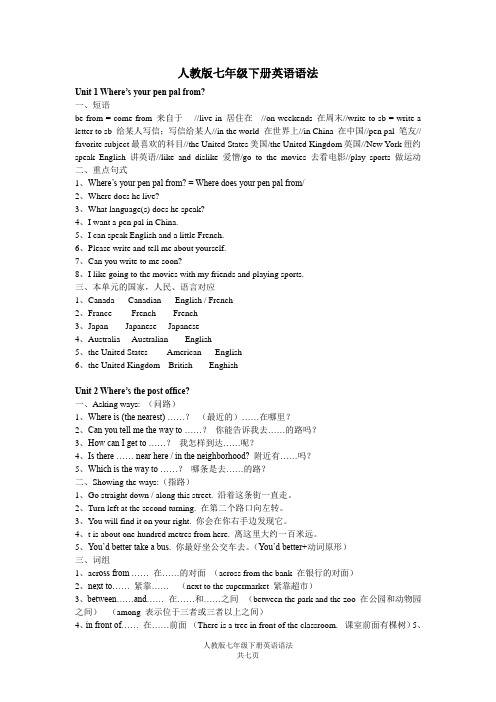
人教版七年级下册英语语法Unit 1 Where’s your pen pal from?一、短语be from = come from 来自于----//live in 居住在---//on weekends 在周末//write to sb = write a letter to sb 给某人写信;写信给某人//in the world 在世界上//in China 在中国//pen pal 笔友// favorite subject最喜欢的科目//the United States美国/the United Kingdom英国//New Y ork纽约speak English 讲英语//like and dislike 爱憎/go to the movies 去看电影//play sports 做运动二、重点句式1、Where’s your pen pal from? = Where does your pen pal from/2、Where does he live?3、What language(s) does he speak?4、I want a pen pal in China.5、I can speak English and a little French.6、Please write and tell me about yourself.7、Can you write to me soon?8、I like going to the movies with my friends and playing sports.三、本单元的国家,人民、语言对应1、Canada---- Canadian---- English / French2、France------ French------French3、Japan------Japanese----Japanese4、Australia----Australian----- English5、the United States------ American---- English6、the United Kingdom---British----- EnghishUnit 2 Where’s the post office?一、Asking ways: (问路)1、Where is (the nearest) ……?(最近的)……在哪里?2、Can you tell me the way to ……?你能告诉我去……的路吗?3、How can I get to ……?我怎样到达……呢?4、Is there …… near here / in the neighborhood? 附近有……吗?5、Which is the way to ……?哪条是去……的路?二、Showing the ways:(指路)1、Go straight down / along this street. 沿着这条街一直走。
期末复习人教版英语七年级下册单元重点知识点语法汇总

人教版七年级下册-单元重点语法汇总U1情态动词can的用法can是情态动词,意为“能,会”,表示某人或某物具备的能力,还可用来提出请求,没有人称和数的变化,后面直接接动词原形。
下面学习情态动词can的常见用法。
1.表示“能力”,意为“能,会”。
例句:I can speak English.我会讲英语。
2.表示“请求”或“许可”。
例句:Can you help me with my Chinese?你能帮我学汉语吗?You can go to the park after you finish your homework.你做完作业后可以去公园。
3.含有情态动词can的肯定句变否定句时,需在can后加not,其缩写形式为can’t;变疑问句时,情态动词can直接放在句首,构成一般疑问句。
例句:I can sing English songs.我会唱英文歌。
(肯定句)→I can’t sing English songs.我不会唱英文歌。
(否定句)Yao Ming can play basketball.姚明会打篮球。
→Can Yao Ming play basketball?姚明会打篮球吗?(一般疑问句)4.对Can…问句的回答可以用下面几种形式:对询问能力的问句的回答可以说“Yes,…can.”或“No,…can’t.”,表示对能力的肯定或否定;对表示请求的问句的回答可以说“OK./All right.”,表示同意对方的请求。
也可用certainly或sorry来回答。
用certainly作肯定回答,语气更肯定;用sorry作否定回答,语气则更委婉、客气。
例句:—Can you speak English?你会说英语吗?—Yes,I can.是的,我会。
—Can I see your pencil-box,please?请问,我可以看一下你的铅笔盒吗?—All right./Certainly.Here you are.可以。
初一英语语法句子总结归纳人教版下册
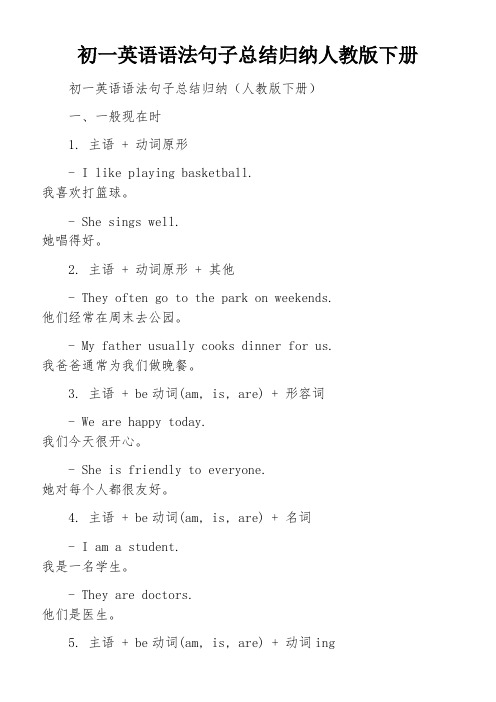
初一英语语法句子总结归纳人教版下册初一英语语法句子总结归纳(人教版下册)一、一般现在时1. 主语 + 动词原形- I like playing basketball.我喜欢打篮球。
- She sings well.她唱得好。
2. 主语 + 动词原形 + 其他- They often go to the park on weekends.他们经常在周末去公园。
- My father usually cooks dinner for us.我爸爸通常为我们做晚餐。
3. 主语 + be动词(am, is, are) + 形容词- We are happy today.我们今天很开心。
- She is friendly to everyone.她对每个人都很友好。
4. 主语 + be动词(am, is, are) + 名词- I am a student.我是一名学生。
- They are doctors.他们是医生。
5. 主语 + be动词(am, is, are) + 动词ing- He is playing football in the park.他正在公园里踢足球。
- We are watching a movie at home.我们正在家里看电影。
二、一般过去时1. 主语 + 动词过去式- I listened to music yesterday.昨天我听音乐。
- She played chess with her friends last night.昨晚她和朋友下棋。
2. 主语 + be动词(was, were) + 形容词- He was tired after school.放学后他感到累。
- They were happy at the party.派对上他们很快乐。
3. 主语 + be动词(was, were) + 名词- I was a student two years ago.两年前我是一名学生。
人教版七年级下册英语Unit1-12语法总结
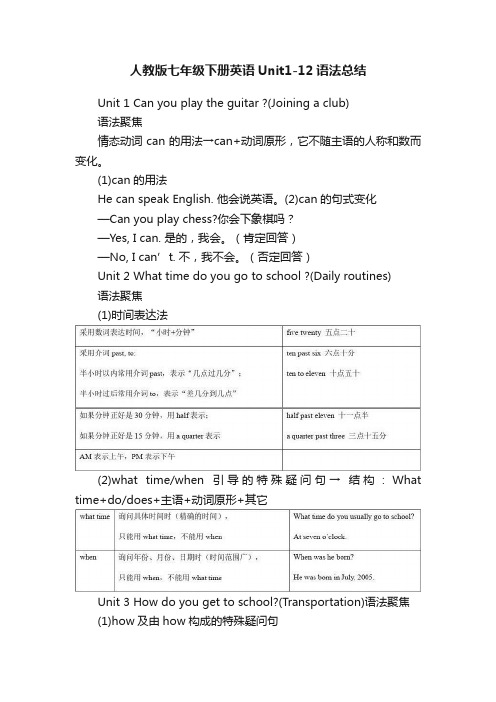
人教版七年级下册英语Unit1-12语法总结Unit 1 Can you play the guitar ?(Joining a club)语法聚焦情态动词can的用法→can+动词原形,它不随主语的人称和数而变化。
(1)can的用法He can speak English. 他会说英语。
(2)can的句式变化—Can you play chess?你会下象棋吗?—Yes, I can. 是的,我会。
(肯定回答)—No, I can’t. 不,我不会。
(否定回答)Unit 2 What time do you go to school ?(Daily routines)语法聚焦(1)时间表达法(2)what time/when引导的特殊疑问句→ 结构:What time+do/does+主语+动词原形+其它Unit 3 How do you get to school?(Transportation)语法聚焦(1)how及由how构成的特殊疑问句(2)how构成的其它特殊疑问词组how oldhow muchhow manyUnit 4 Don’t eat in class.(Rules)语法聚焦(1)祈使句:用来发出命令或指示,提出要求、建议、劝告等的句子(2)情态动词Unit 5 Why do you like pandas?(Animals in a zoo)语法聚焦(1)Why, what, where引导的特殊疑问句(2)拓展:becausebecause表示“因为”,so表示“所以”,但是两个句子不能同时出现在一个句子中,二者用其一即可。
例:Because I am free today,so I can go to the zoo. (×)I am free today,so I can go to the zoo. (√)Because I am free today, I can go to the zoo. (√)because后面要加句子,而because of 后面加名词(短语)、代词等。
人教版初一英语下册知识点

人教版初一英语下册知识点
以下是初一英语下册部分重点知识点:
1. 一般现在时:表示经常或习惯性的动作或状态,常与always, usually, often, sometimes, every day 等时间状语连用。
2. 现在进行时:表示现在正在进行的动作或状态,常与now, at the moment, Look! Listen! 等时间状语连用。
3. 一般过去时:表示过去某个时间发生的动作或状态,常与yesterday, last week, in 2000 等时间状语连用。
4. 祈使句:用于表达请求、命令、建议或劝告等,通常以动词原形开头,句末用句号或感叹号。
5. There be 句型:表示“某地有某物”,其中be 动词的形式根据主语的单复数形式而定。
6. 形容词和副词的比较级和最高级:用于比较两个或两个以上的人或事物,比较级用于两者之间的比较,最高级用于三者或三者以上的比较。
7. 情态动词:表示能力、可能性、请求、建议、许可等,如can, could, may, might, must, have to 等。
人教版七年级英语下册单词,短语,句型,语法总结
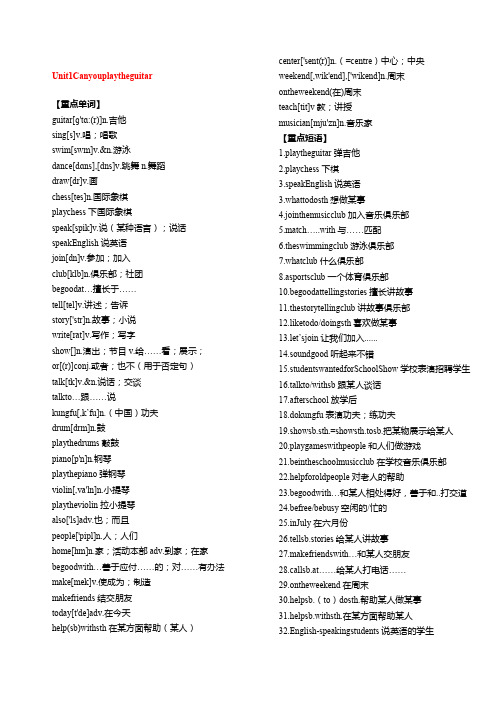
Unit1Canyouplaytheguitar【重点单词】guitar[ɡ'tɑ:(r)]n.吉他sing[s]v.唱;唱歌swim[swm]v.&n.游泳dance[dɑns],[dns]v.跳舞n.舞蹈draw[dr]v.画chess[tes]n.国际象棋playchess下国际象棋speak[spik]v.说(某种语言);说话speakEnglish说英语join[dn]v.参加;加入club[klb]n.俱乐部;社团begoodat…擅长于……tell[tel]v.讲述;告诉story['str]n.故事;小说write[rat]v.写作;写字show[]n.演出;节目v.给……看;展示;or[(r)]conj.或者;也不(用于否定句)talk[tk]v.&n.说话;交谈talkto…跟……说kungfu[,k’fu]n.(中国)功夫drum[drm]n.鼓playthedrums敲鼓piano[p'n]n.钢琴playthepiano弹钢琴violin[,va'ln]n.小提琴playtheviolin拉小提琴also['ls]adv.也;而且people['pipl]n.人;人们home[hm]n.家;活动本部adv.到家;在家begoodwith…善于应付……的;对……有办法make[mek]v.使成为;制造makefriends结交朋友today[t'de]adv.在今天help(sb)withsth在某方面帮助(某人)center['sent(r)]n.(=centre)中心;中央weekend[,wik'end],['wikend]n.周末ontheweekend(在)周末teach[tit]v教;讲授musician[mju'zn]n.音乐家【重点短语】1.playtheguitar弹吉他2.playchess下棋3.speakEnglish说英语3.whattodosth想做某事4.jointhemusicclub加入音乐俱乐部5.match…..with与……匹配6.theswimmingclub游泳俱乐部7.whatclub什么俱乐部8.asportsclub一个体育俱乐部10.begoodattellingstories擅长讲故事11.thestorytellingclub讲故事俱乐部12.liketodo/doingsth喜欢做某事13.let’sjoin让我们加入......14.soundgood听起来不错15.studentswantedforSchoolShow学校表演招聘学生16.talkto/withsb跟某人谈话17.afterschool放学后18.dokungfu表演功夫;练功夫19.showsb.sth.=showsth.tosb.把某物展示给某人20.playgameswithpeople和人们做游戏21.beintheschoolmusicclub在学校音乐俱乐部22.helpforoldpeople对老人的帮助23.begoodwith…和某人相处得好,善于和..打交道24.befree/bebusy空闲的/忙的25.inJuly在六月份26.tellsb.stories给某人讲故事27.makefriendswith…和某人交朋友28.callsb.at……给某人打电话……29.ontheweekend在周末30.helpsb.(to)dosth.帮助某人做某事31.helpsb.withsth.在某方面帮助某人32.English-speakingstudents说英语的学生33.Itis+adj+(forsb)tosth.做某事(对于某人来说)是…..34.playthepiano弹钢琴35.playtheviolin拉小提琴36.theStudents’SportsCenter学生运动中心37.needhelptoteachmusic需要帮助来做某事38.needsb.todosth需要某人做某事39.teachsb.todosth教某人做某事40.beinourschoolmusicfestival参加我们学校的音乐节【重点句型】1.—Canyouswim你会游泳吗?—No,Ican’t.不,我不会。
(完整版)新人教版英语七年级下册1-12单元知识点归纳

Unit 1 Can you play the guitar?语言点梳理一、语法:情态动词:有一定意义,表示说话人的语气或情态,但不能单独作谓语,只能和其他动词原形一起构成谓语,没有人称和数的变化。
否定形式是在情态动词后面加上not。
变一般疑问句要把情态动词提到句子的开头,即:情态动词+主语+动词原形+其他?1.肯定句:He/She/I/We/They/You/Tom+情态动词can+动词原形.2.否定句:He/She/I/We/They/You/Tom+情态动词can+not+动词原形3.一般疑问句:情态动词can+ He/She/I/We/They/You/Tom+动词原形?Yes,主语+can./No,主语+ can’t.1)表示能力,“会;能”。
eg: Can you dance? 你会跳舞吗?2)表示请求或许可,“可以”。
eg: Can I ask you a question? 我可以问你一个问题吗?1. play the guitar/piano/violin/drums弹吉他/钢琴/小提琴/敲鼓play chess下象棋play sports 做运动play soccer/basketball踢足球、打篮球(乐器名称前加the,球类名称前不加the)2. join the art club加入艺术俱乐部/swimming club游泳俱乐部sports club运动俱乐部/story telling club讲故事俱乐部English club/ art club/ music clubjoin v.参加,加入指加入某个团体,组织,群体,并成为其中的一员。
What club do you want to join ?你想加入什么俱乐部?I want to join the swimming club.=I want to be in the swimming club.takeEg. take part in the meeting参加会议3. want sth.想要某物want to do sth.想做某事want sb to do sth 想要某人做某事4. be good at(doing...)擅长于=do well in 在某方面做得好be good with与…相处的好be good for对…有益5. like to do sth.喜欢做某事like doing sth.6. Let’s do sth.让我干…let/make sb.do sth.使某人做某事10. write stories写故事write to sb= write a letter to sb= write sb a letter11.tell /speak/say/talk的用法1) tell讲述一件事实或故事等及物动词tell sb. sth 给某人讲某事=tell sth to sb 把某事告诉某人tell sb. to do sth 告诉某人做某事tell stories讲故事=tell a story tell a lie撒谎2)speak v. 主要是讲说话的能力,往往接语言speak English讲英语3)talk 为不及物动词往往加介词再接宾语talk to sb.和…交谈/talk with sb.和…交谈(指双方)4)say往往接说话的内容eg.Our teacher says we should study hard.say it in English用英语说它12. make friends with sb.和…交朋友13. play games with sb.和…做游戏14. help sb. with sth.= help sb. (to) do sth.帮助某人做某事15. call sb. at +电话号码给某人打电话拨+号码16. on /at the weekend 在周末on weekends after school放学后17.do Chinese kung fu 打中国功夫18.be free 空闲的19. sing very well 唱得好That sounds good. 那听起来很好20.English-speaking students 讲英语的学生学生运动中心23.also /too/eitheralso/too用在肯定句,also 用于句中,too 用于句尾,either用于否定句句未eg. I am a student . He is a student,too. I am a student . He is also a student.I am not a student . He is not a student, either.24.and/or 连接两个并列成分eg.I can sing and dance.(and用于肯定句)I can’t sing or dance.(or用于否定句)Can you sing or dance ?(or用于选择疑问句“或者”)25.at27. need to do sth需要干某事need sb. to do sth 需要某人干某事28.wanted students for School show学校表演招聘学生v.展示;给….看… show sb. Sth= show Sth to sb.给某人展示n.节目;表演TV show电视节目29.teach v.教,讲授teacher n.教师teach sb.English教某人英语teach sb. sth .= teach sth to sb.教给某人某事=教某事给某人teach sb.to do sth教给某人做某事30.music n.音乐musician n. 音乐家31.piano (pl.) pianosUnit 2 What time do you go to school?知识点梳理1.What time do you get up?What time +助动词do/does +主语+动词原形,询问某人做某事的具体时间。
人教版七年级下册英语语法
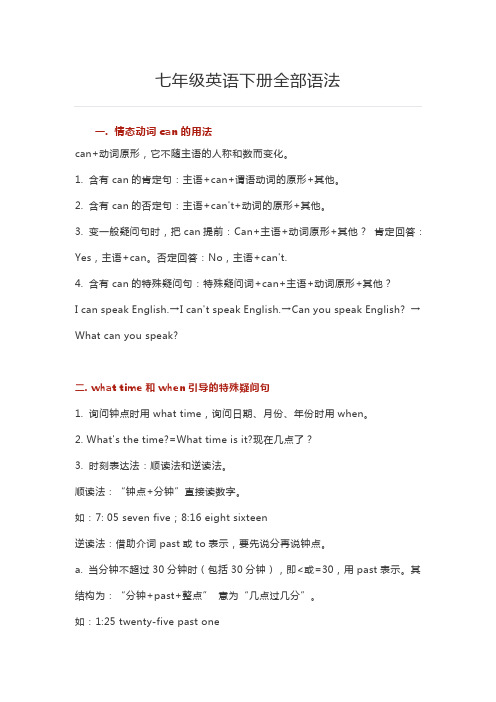
一. 情态动词can的用法can+动词原形,它不随主语的人称和数而变化。
1. 含有can的肯定句:主语+can+谓语动词的原形+其他。
2. 含有can的否定句:主语+can't+动词的原形+其他。
3. 变一般疑问句时,把can提前:Can+主语+动词原形+其他?肯定回答:Yes,主语+can。
否定回答:No,主语+can't.4. 含有can的特殊疑问句:特殊疑问词+can+主语+动词原形+其他?I can speak English.→I can't speak English.→Can you speak English? →What can you speak?二. what time和when引导的特殊疑问句1. 询问钟点时用what time,询问日期、月份、年份时用when。
2. What's the time?=What time is it?现在几点了?3. 时刻表达法:顺读法和逆读法。
顺读法:“钟点+分钟”直接读数字。
如:7: 05 seven five;8:16 eight sixteen逆读法:借助介词past或to表示,要先说分再说钟点。
a. 当分钟不超过30分钟时(包括30分钟),即<或=30,用past表示。
其结构为:“分钟+past+整点”意为“几点过几分”。
如:1:25 twenty-five past oneb. 当超过30分钟时,即>30,用to表示。
其结构为:“所差分钟(即60—所过分钟数)+to+下一个整点”,to译成“差”,差几分钟到几点。
如:4:38 twenty-two to fivec. 当分钟为30分钟用half表示,当分钟为15分钟用a quarter。
三. how引导的特殊疑问句1. how 引导的特殊疑问句提问交通方式,其答语分三种情况:a. take a/an/the+交通工具(单数)b. by+交通工具(单数)c. on/in+限定词+交通工具---How do you go to school every day?---I take a bus to go to school every day./I go to school by bus every day./I go to school on the bus every day.2. how far 用来提问距离,多远,其答语分为两种:(1)用长度单位表示:It is five kilometers.(2)用时间表示:It’s twenty minutes’walk.3. how long 用来提问时间,意为多久回答常用“for+段时”。
人教版初一(下)英语重点语法汇总
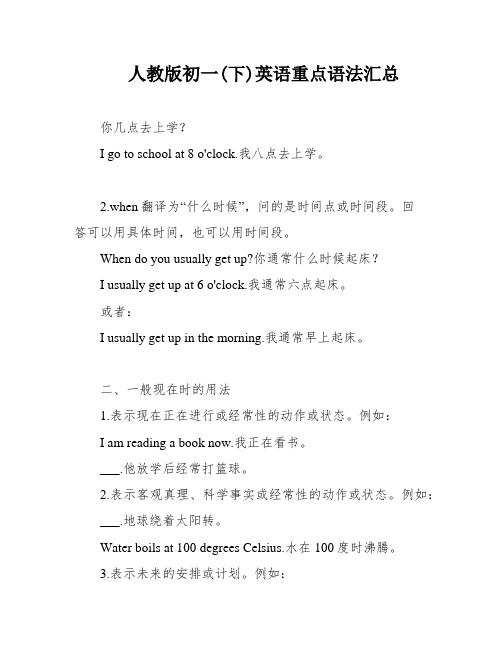
人教版初一(下)英语重点语法汇总你几点去上学?I go to school at 8 o'clock.我八点去上学。
2.when翻译为“什么时候”,问的是时间点或时间段。
回答可以用具体时间,也可以用时间段。
When do you usually get up?你通常什么时候起床?I usually get up at 6 o'clock.我通常六点起床。
或者:I usually get up in the morning.我通常早上起床。
二、一般现在时的用法1.表示现在正在进行或经常性的动作或状态。
例如:I am reading a book now.我正在看书。
___.他放学后经常打篮球。
2.表示客观真理、科学事实或经常性的动作或状态。
例如:___.地球绕着太阳转。
Water boils at 100 degrees Celsius.水在100度时沸腾。
3.表示未来的安排或计划。
例如:___.我们明天去北京。
___ arrives at 8 o'clock tonight.火车今晚八点到达。
三、一般现在时的构成一般现在时的肯定句结构为:主语+动词原形(第三人称单数要加-s)+其他。
例如:I like ___ football.我喜欢踢足球。
She studies hard every day.她每天都努力研究。
否定句在动词前加___'t,疑问句将助动词do/does提前。
例如:I don't ___.我不喜欢打篮球。
Does he often watch TV?他经常看电视吗?What time do you go to school?I go to school at 7:30 in the morning.When asking about time。
"when" can be used to ask for a specific time or a general time frame。
2024人教版七年级英语
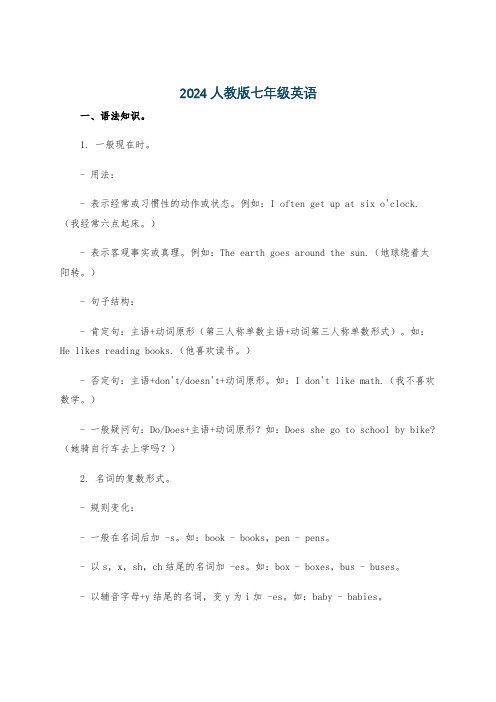
2024人教版七年级英语一、语法知识。
1. 一般现在时。
- 用法:- 表示经常或习惯性的动作或状态。
例如:I often get up at six o'clock.(我经常六点起床。
)- 表示客观事实或真理。
例如:The earth goes around the sun.(地球绕着太阳转。
)- 句子结构:- 肯定句:主语+动词原形(第三人称单数主语+动词第三人称单数形式)。
如:He likes reading books.(他喜欢读书。
)- 否定句:主语+don't/doesn't+动词原形。
如:I don't like math.(我不喜欢数学。
)- 一般疑问句:Do/Does+主语+动词原形?如:Does she go to school by bike?(她骑自行车去上学吗?)2. 名词的复数形式。
- 规则变化:- 一般在名词后加 -s。
如:book - books,pen - pens。
- 以s,x,sh,ch结尾的名词加 -es。
如:box - boxes,bus - buses。
- 以辅音字母+y结尾的名词,变y为i加 -es。
如:baby - babies。
- 以o结尾的名词,有生命的加 -es(如:potato - potatoes,tomato - tomatoes),无生命的加 -s(如:photo - photos)。
- 不规则变化:- 例如:man - men,woman - women,child - children,foot - feet,tooth - teeth等。
3. 形容词性物主代词。
- 包括:my(我的),your(你的/你们的),his(他的),her(她的),its (它的),our(我们的),their(他们的)。
- 用法:用来修饰名词,表示所属关系。
例如:This is my book.(这是我的书。
)二、词汇积累。
人教版英语七年级下册全册语法总结,提前收藏

人教版英语七年级下册全册语法总结,提前收藏人教版英语七年级下册全册语法总结Unit 1 Can you play the guitar?情态动词can情态动词是表示说话人的语气或情态,本身有词义但不能单独作谓语的词。
常用的情态动词有can,may,must,could,shall,will,need等。
情态动词在句中必须后跟动词原形,并与后面的动词一起构成谓语。
情态动词没有人称和数的变化。
1、情态动词can的用法:(1)表示能力,意为“能,会”。
例如:Millie can play the piano.(2)表示许可,意为“可以”。
例如:You can use my pen. Can you pass me the books?(3)表示推测,意为“可能,会”,主要用于否定句和疑问句中。
例如:Can he be here?He can’t have finished his homework.Unit 2 What time do you go to school?频度副词英语中常见的频度副词有usually, sometimes, always, often, seldom, never等,它们用来表示动作发生的频率,但是在程度上有所区别,频率由高到低依次是:always>usually>often>sometimes>seldom>never。
频度副词放在be动词、情态动词和助动词之后,实义动词之前,对频率的提问用how often。
He’s always busy.I never play a trick on others.Unit 3 How do you get to school?how, how long和how far引导的特殊疑问句how用来提问方式,表示“如何”;how long用来提问时间,表示“多长时间”;how far用来提问距离,意为“多远”。
人教版七年级下英语语法
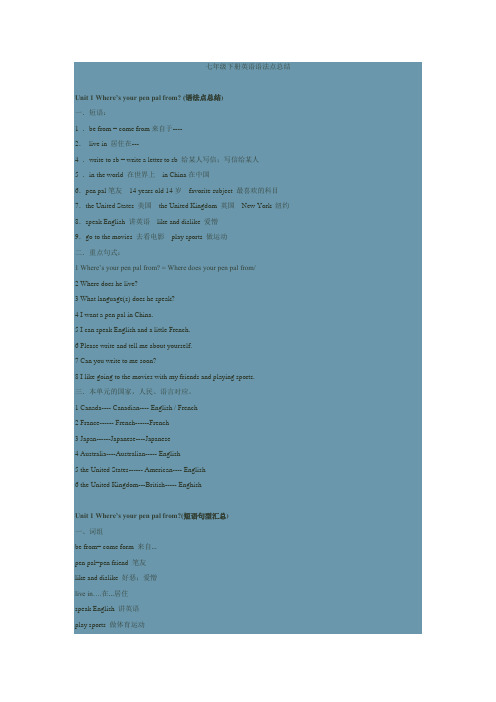
七年级下册英语语法点总结Unit 1 Where’s your pen pal from? (语法点总结)一.短语:1 .be from = come from 来自于----2.live in 居住在---4 .write to sb = write a letter to sb 给某人写信;写信给某人5 .in the world 在世界上in China 在中国6.pen pal 笔友14 years old 14岁favorite subject 最喜欢的科目7.the United States 美国the United Kingdom 英国New York 纽约8.speak English 讲英语like and dislike 爱憎9.go to the movies 去看电影play sports 做运动二.重点句式:1 Where’s your pen pal from? = Where does your pen pal from/2 Where does he live?3 What language(s) does he speak?4 I want a pen pal in China.5 I can speak English and a little French.6 Please write and tell me about yourself.7 Can you write to me soon?8 I like going to the movies with my friends and playing sports.三.本单元的国家,人民、语言对应。
1 Canada---- Canadian---- English / French2 France------ French------French3 Japan------Japanese----Japanese4 Australia----Australian----- English5 the United States------ American---- English6 the United Kingdom---British----- EnghishUnit 1 Where’s your pen pal from?(短语句型汇总)一、词组be from= come form 来自...pen pal=pen friend 笔友like and dislike 好恶;爱憎live in….在...居住speak English 讲英语play sports 做体育运动a little French 一些法语go to the movies 去看电影an action movie 一部动作片on weekends 在周末Excuse me 对不起,打扰get to 到达、抵达beginning of 在...开始的时候at the end of 在...结束的时候arrive at /二、句型(1)、Where主+be+主语+from?主语+be +from+地点.(2)、Where do/does+主语+live?主语+live/lives in…(3)、What language do/does +主语+speak?主语+speak/speaks….(4)、主语+like/likes +doing…三、日常交际用语1-Where is your pen pal from?-He’s from China.2-Where does she live?--She lives in Tokyo.3-Does she speak English?-Yes, she does/ No, she dosen’t.4-Is that your new pen pal?-Yes, he is / No, e isn’t.5-What language does she speak?-She speaks English.Unit 2 Where’s the post office? (语法点总结)一. Asking ways: (问路)1.Where is (the nearest) ……?(最近的)……在哪里?2.Can you tell me the way to ……?你能告诉我去……的路吗?3.How can I get to ……?我怎样到达……呢?4.Is there …… near here / in the neighborhood?附近有……吗?5.Which is the way to ……?哪条是去……的路?二.Showing the ways: (指路)1. Go straight down / along this street. 沿着这条街一直走。
人教版下册初一英语语法

初一下册英语语法Unit 1 Where's your pen pal from?Canada[´kænədə] (加拿大) France[frɑ:ns] (法国)Japan[dʒə´pæn] (日本) Australia[ɒ´streIljə] (澳大利亚) China[´tʃaInə](中国) Singapore['siŋgə.pəʊr] (新加坡)Tokyo['təʊkIəʊ](东京) Paris['pærIs](巴黎)Sydney['sIdnI](悉尼) Toronto[tə'rɒntəʊ](多伦多) New York['nju: 'jɔ:k](纽约)language[´læŋgwIdʒ] (语言) pal[pæl] (伙伴、好友)from[frɒm] (来自)the United States[jʊ(:)´naIt steIts] (美国) 缩写USAthe United Kingdom[jʊ(:)´naIt ´kIŋdəm] (英国)the United States=the USA=America(美国)the United Kingdom=the UK =England (英国)一.听力Activity 1a: Listen and repeat these countries.Canada France Japan the United States Australia Singapore the United Kingdom ChinaActivity 1b: Listen and circle the countries in 1a you hear.Boy1: Where is your pen pal from, Mike?Boy2: He's from Canada.Boy1: Really? My pen pal's from Australia. How about you, Lily?Where's your pen pal from?Girl1: She's from Japan. Where is Tony's pen pal from?(所有格) Gril2: I think she‟s from Singapore.Activity 2b: Listen and circle the countries in 2a you hear. Conversation1A: Where's your pen pal from, John?B: He's from Japan.A: Oh, really? Where does he live?B: Tokyo.Conversation2A: Where's your pen pal from, Jodie?B: She's from France.A: So, where does she live?B: Oh, she lives in Paris.Conversation3A: Andrew, where's your pen pal from?B: She's from Australia.A: Uh-huh. Where does she live?B: She lives in Sydney.Activity 2c: Listen again...↑Activity 2a: Listen and number the questions you hear.Mom: Is that your new pen pal, Lucy?Lucy: Yes, it is.Mom: Oh, what‟s her name?Lucy: Her name is Maria.Mom: Un-huh. And where is she from?Lucy: Um, she‟s from Canada.Mom: Un-huh. Where does she live?Lucy: She lives in Toronto.Mom: Does she have any brothers or sisters?Lucy: Yes, she does. She has tow brothers and tow sisters.Mom: Does she speak English?Lucy: Yes. She speaks English and Spanish.Activity 2b: Listen again…Activity 3a: Read this letter. Then write answers to the questions in the box.Dear Student,My name is Bob. I live in Toronto , Canada, and I want a pen pal in China. I think China is a very interesting country. I‟m 14 years old and my birthday is in November. I can speak English and a little French. I have a brother, Paul and sister, Sarah. They have pen pals in the United Kingdom and Australia. I like going to the movies with my friends and playing sports. My favorite subject in school is P.E(体育课). It‟s fun. But I don‟t like math. It‟s too difficult!Can you write to me soon?Bob二.要点分析1. be from的用法。
人教版初一英语下册第一单元语法讲解
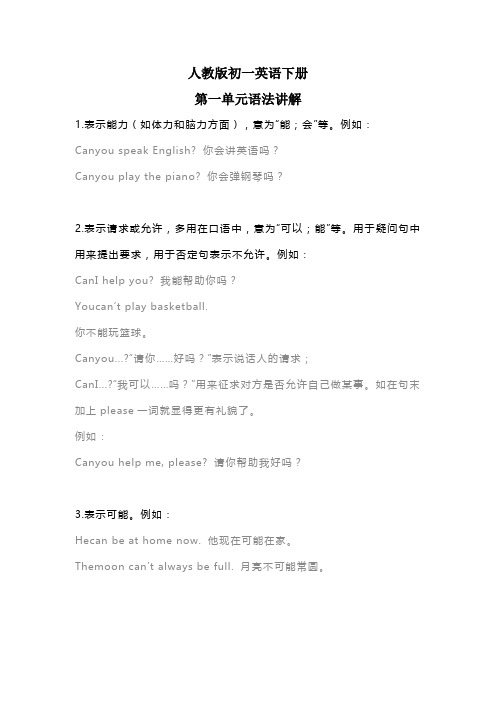
人教版初一英语下册第一单元语法讲解1.表示能力(如体力和脑力方面),意为“能;会”等。
例如:Canyou speak English? 你会讲英语吗?Canyou play the piano? 你会弹钢琴吗?2.表示请求或允许,多用在口语中,意为“可以;能”等。
用于疑问句中用来提出要求,用于否定句表示不允许。
例如:CanI help you? 我能帮助你吗?Youcan’t play basketball.你不能玩篮球。
Canyou...?“请你……好吗?”表示说话人的请求;CanI...?“我可以……吗?”用来征求对方是否允许自己做某事。
如在句末加上please一词就显得更有礼貌了。
例如:Canyou help me, please? 请你帮助我好吗?3.表示可能。
例如:Hecan be at home now. 他现在可能在家。
Themoon can’t always be full. 月亮不可能常圆。
4.表示怀疑。
在表达此意时,只能用于一般疑问句中,带有感情色彩。
例如:Canit be true? 那会是真的吗?句式变化如下:1.在变否定句时,直接在can后加上“not”,可缩写成can’t或cannot,但不能写成cann’t。
例如:Hecan swim. → He can’t swim.Tonycan see the pen on the desk.→ Tony cannot see the pen on the desk.在变一般疑问句时,直接移到主语前(原主语的首字母改成小写,第一人称应变为第二人称)即可。
例如:Ican see an orange on the table. → Canyou see an orange on the table?其回答可用Yes,OK或Certainly等作肯定回答;用No或Sorry等作否定回答。
例如:—Canyou look after my dog, please? 你能照看一下我的狗吗?—OK.可以。
- 1、下载文档前请自行甄别文档内容的完整性,平台不提供额外的编辑、内容补充、找答案等附加服务。
- 2、"仅部分预览"的文档,不可在线预览部分如存在完整性等问题,可反馈申请退款(可完整预览的文档不适用该条件!)。
- 3、如文档侵犯您的权益,请联系客服反馈,我们会尽快为您处理(人工客服工作时间:9:00-18:30)。
Unit 1 Where's your pen pal from?一、词组be from= come from 来自...pen pal=pen friend 笔友like and dislike 好恶;爱憎live in....在...居住speak English 讲英语play sports 做体育运动a little French 一些法语go to the movies 去看电影an action movie 一部动作片on weekends 在周末Excuse me 对不起,打扰get to 到达、抵达beginning of 在...开始的时候at the end of 在...结束的时候arrive at /二、句型(1)、Where主 +be+主语+from?主语+be+from+地点.(2)、Where do/does+主语+live?主语+live/lives in...(3)、What language do/does +主语+speak?主语+speak/speaks....(4)、主语+like/likes+doing...三、日常交际用语1-Where is your pen pal from?-He's from China.2-Where does she live?--She lives in Tokyo.3-Does she speak English?-Yes, she does/No, she dosen't.4-Is that your new pen pal?-Yes, he is /No, he isn't.5-What language does she speak?-She speaks English.Unit 2 Where's the post office一、词组post office 邮局pay phone 投币式公用电话next to 在...隔壁across from 在...对面in front of 在...前面between...and... 在...和...之间on a street 在街上in the neighborhood 在附近on the right/left 在右边/在左边on one's right/left 在某人的右边/左边turn right/left 向右/左转take a walk 散步have fun 玩得开心the way to ...去...的路take a taxi 打的/乘出租车go down(along)...沿着...走go through...穿过...have a good trip 旅途愉快二、句型(1)、Is there a bank near here?Yes,there is .It's on Centre Street.No,there isn't.(2)、Where's the supermarket?It's next to the library.(3)、Bridge Street is a good place to have fun.(4)、I hope you have a good trip.(5)、If you are hungry,you can buy food in the restaurant.(6)、Talk a walk though the park..(7)、enjoy后接名词或动词-ing形式.Do you enoy(=like) your work?Do you enjoy(=like) living in the city?三、日常交际用语(1)、Is there a ....?句型Eg:-Excuse me.Is there a hotel in the neighborhood.-Yes, there is. No.there isn't(2)、Where is ...?句型Eg:-Where is the park,please?-It's behind the bank.(肯定回答)-I'm sorry I don't know. (否定回答)(3)、Which is the way to +地点? 句型.例如:- Which is the way to the library.(4)、How can I get to +地点?句型.例如:-How can I get to the restaurant?(5)、Can you tell me the way to +地点?句型.例- Can you tell me the way to the post office?(6)、Let me tell you the way to my house.(7)、Just go straight and turn left.Unit 3 Why do you like koalas?一、词组want to do sth .想要做某事want sb to do sth 想要某做某事want sth 想要某物Let sb do sth 让某人做某事kind of 有几分\种类a kind of 一种......years old ...年龄如:ten years old 十岁like to do sth 喜欢做某事like doing sthplay with ... 与...一起玩be quiet 安静during the day 在白天at night 在夜间have a look at.. 看...one...the other 一个...另一个...二、句型(1)、-why do you like pandas?-Because they're very cure.(2)、-Why dose he like koalas?-Because they are kind of interesting.(3)、-Where are lions from?-Lions are from South Africa.(4)、-What animals do you like?-I like elephants.三、日常交际用语(1)、-Let's see the lions.(2)-Why do you want to see the lions?-Becase they are very cute.(3)-Do you like giraffes?Yes,I do./ No,I don't(4)-What other animal do you like?_I like dogs.tooother+ 名词的复数.表示没有特定的数量范围the other+名词的复数表示有特定的数量范围.(5)-Why are you looking at me?-Because you are very cute.(6)-Let us play games. -Great!Let me see.Unit 4 I want to be an actor.一、词组want to be+职业想要成为。
shop assistant 店员bank clerk 银行职员work with 与。
一起工作work hard 努力工作work for 为。
而工作work as 作为。
而工作get.. from...从。
获得。
give sth.to.sb /give.sb.sth 把某物给某人正确的表示:give it/them to sb.错误的表示:give sb.it/themin the day 在白天at night 在夜间talk to /with 与...讲话go out to dinners 外出吃饭in a hospital 在医院newspaper reporter 报社记者movie actor 电影演员二、句型(1)-What do/does+某人+do?例:-What do you do?-I'm a student.-What dose he do? He's a teacher.(2)-What do/does+某人+want to be?例:What do you want to be?-I want to be a teacher. -What does she want to be ?She want to be a nuser.(3)-Where does your sister work?-She works in a hospital.(4)-Does he work in the hospiatYes.he does/No,he doesn't(5)-Does she work late?-Yes,she does/No.she doesn't(6)-英语中询问职业的几种表达方式:What do/does ...do?What is...? What is your father?What's one's job?例:What's your father's job?Unit 5 I'm watching TV.一、词组do homework 做家庭作业watch TV 看电视eat dinner 吃饭;就餐clean the room 打扫房间read newspaper/a book 看报纸/看书go to the movies 看电影write a letter 写信wait for 等待;等候talk about 谈论。
play basketball/soccer/ 打篮球/踢足球take photos 拍照TV show 电视节目Some of。
中的一些a photo of my family 我的家庭照at school 在学校be with 和。
一起in the tree 在树上二、句型(1)-What+be+主语+doing? ....正在做什么?-主语+be+doing。
...正在做某事。
例:-what are you doing?-I'm doing my homework.(2)-Thanks for ... 为。
而感谢例:Thanks for your letter.(3)-Here are/is...例:Here are some of my photos.Here is a photo of my family.(4)-That sounds good.(5)-This TV show is boring.三、日常交际用语(1)-Do you want to go to the movices? -Sure.(2)-When do you want to go? -Let's go at seven.(3)-Where do people play basketball? -At school.(4)-What's he waiting for?-He's waiting for a bus.(5)-What's he reading? He's reading a newspaper.1)现在在进行时的形式是:助动词be(am,is,are)+动词-ing形式(也叫现在分词),表示现在(说话的瞬间)正在进行或发生的动作。
